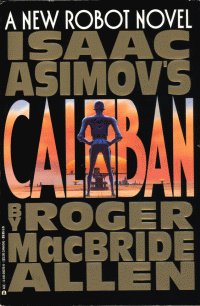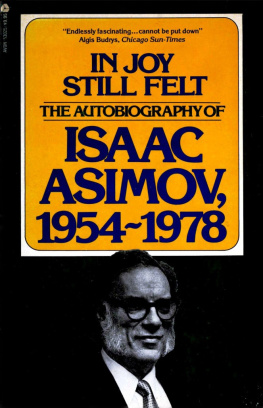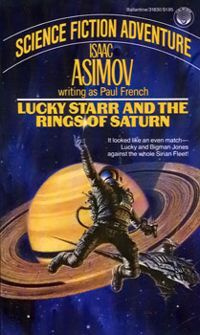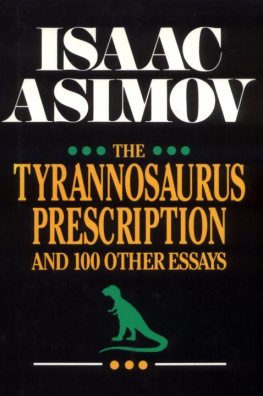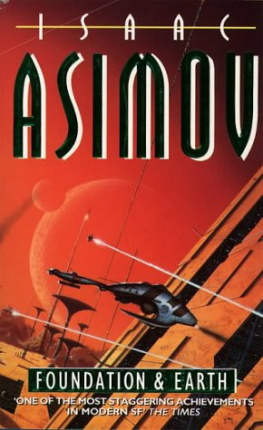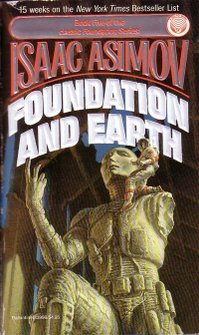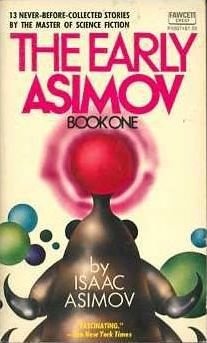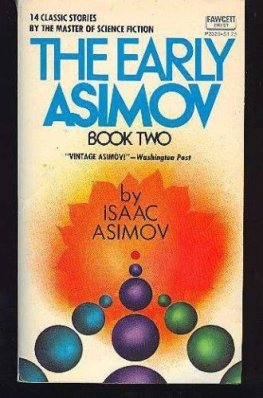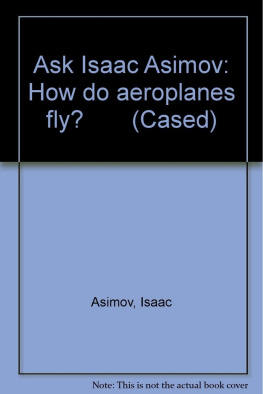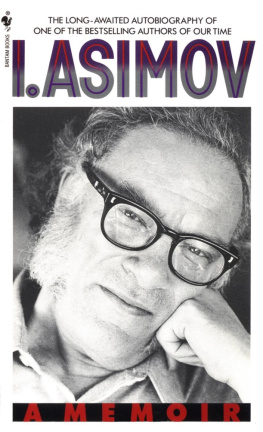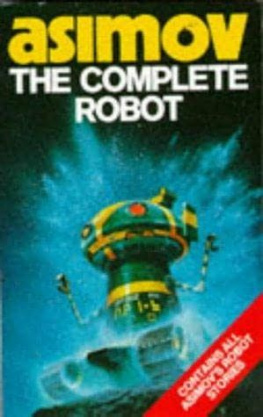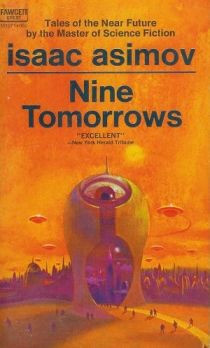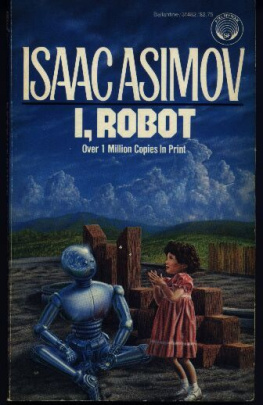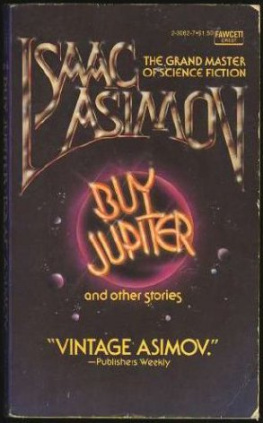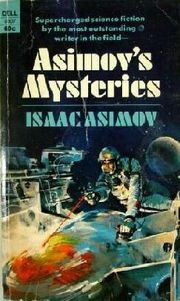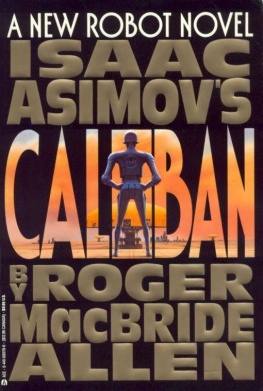Isaac Asimov - Caliban
Here you can read online Isaac Asimov - Caliban full text of the book (entire story) in english for free. Download pdf and epub, get meaning, cover and reviews about this ebook. year: 1997, publisher: Ace Books, genre: Science fiction. Description of the work, (preface) as well as reviews are available. Best literature library LitArk.com created for fans of good reading and offers a wide selection of genres:
Romance novel
Science fiction
Adventure
Detective
Science
History
Home and family
Prose
Art
Politics
Computer
Non-fiction
Religion
Business
Children
Humor
Choose a favorite category and find really read worthwhile books. Enjoy immersion in the world of imagination, feel the emotions of the characters or learn something new for yourself, make an fascinating discovery.
- Book:Caliban
- Author:
- Publisher:Ace Books
- Genre:
- Year:1997
- ISBN:044-100482-2
- Rating:3 / 5
- Favourites:Add to favourites
- Your mark:
- 60
- 1
- 2
- 3
- 4
- 5
Caliban: summary, description and annotation
We offer to read an annotation, description, summary or preface (depends on what the author of the book "Caliban" wrote himself). If you haven't found the necessary information about the book — write in the comments, we will try to find it.
Caliban — read online for free the complete book (whole text) full work
Below is the text of the book, divided by pages. System saving the place of the last page read, allows you to conveniently read the book "Caliban" online for free, without having to search again every time where you left off. Put a bookmark, and you can go to the page where you finished reading at any time.
Font size:
Interval:
Bookmark:
Isaac Asimov, Roger MacBride Allen
Caliban
To five wondrous creatures, named in the order of their appearance on this planet:
Aaron
Victoria
Benton
Jonathan
And
Meredith
Acknowledgments
This book would not have been possible without the support, and especially the patience, of David Harris, John Betancourt, Byron Preiss, Susan Allison, Ginjer Buchanan, and Peter Heck. There was many a slip between cup and the lip, but thanks to their collective efforts, never a drop of the good stuff was lost. The book stands as proof once again that every writer needs at least one editor, and sometimes five or six is no bad idea. Thanks are also due to Thomas B. Allen and Eleanore Fox, neither of whom had time to read the manuscript, and both of whom did.
I. A Robot May Not Injure a Human Being, or, Through Inaction, Allow a Human Being to Come to Harm.
II. A Robot Must Obey the Orders Given It by Human Beings Except where Such Orders Would Conflict with the First Law.
III. A Robot Must Protect Its Own Existence As Long As Such Protection Does Not Conflict with the First or Second Law.
THE Spacer-Settler struggle was at its beginning, and at its end, an ideological contest. Indeed, to take a page from primitive studies, it might more accurately be termed a theological battle, for both sides clung to their positions more out of faith, fear, and tradition than through any carefully reasoned marshaling of the facts.
Always, whether acknowledged or not, there was one issue at the center of every confrontation between the two sides: robots. One side regarded them as the ultimate good, while the other saw them as the ultimate evil.
Spacers were the descendants of men and women who had fled semi-mythical Earth with their robots when robots were banned there. Exiled from Earth, they traveled in crude starships on the first wave of colonization from Earth. With the aid of their robots, the Spacers terraformed fifty worlds and created a culture of great beauty and refinement, where all unpleasant tasks were left to the robots. Ultimately, virtuallyall work was left to the robots. Having colonized fifty planets, the Spacers called a halt, and set themselves no other task than enjoying the fruits of their robots labor.
The Settlers were the descendants of those who stayed behind on Earth. Their ancestors lived in great underground Cities, built to be safe from atomic attack. It is beyond doubt that this way of life induced a certain xenophobia into Settler culture. That xenophobia long survived the threat of atomic war, and came to be directed against the smug Spacers-and their robots.
It was fear that had caused Earth to cast out robots in the first place. Part of it was an irrational fear of metal monsters wandering the landscape. However, the people of Earth had more reasonable fears as well. They worried that robots would take jobs-and the means of making a living-from humans. Most seriously, they looked to what they saw as the indolence, the lethargy and decadence of Spacer society. The Settlers feared that robots would relieve humanity of its spirit, its will, its ambition, even as they relieved humanity of its burdens.
The Spacers, meanwhile, had grown disdainful of the people they perceived to be grubby underground dwellers. Spacers came to deny their own common ancestry with the people who had cast them out. But so, too, did they lose their own ambition. Their technology, their culture, their worldview, all became static, if not stagnant, The Spacer ideal seemed to be a universe where nothing ever happened, where yesterday and tomorrow were like today, and the robots took care of all the unpleasant details.
The Settlers set out to colonize the galaxy in earnest, terraforming endless worlds, leapfrogging past the Spacer worlds and Spacer technology. The Settlers carried with them the traditional viewpoints of the home world. Every encounter with the Spacers seemed to confirm the Settlers reasons for distrusting robots. Fear and hatred of robots became one of the foundations of Settler policy and philosophy. Robot hatred, coupled with the rather arrogant Spacer style, did little to endear Settler to Spacer.
But still, sometimes, somehow, the two sides managed to cooperate, however great the degree of friction and suspicion. People of goodwill on both sides attempted to cast aside fear and hatred to work together-with varying success.
It was on Inferno, one of the smallest, weakest, most fragile of the Spacer worlds, that Spacer and Settler made one of the boldest attempts to work together. The people of that world, who called themselves Infernals, found themselves facing two crises. Their ecological difficulties all knew about, though few understood their severity. Settler experts in terraforming were called in to deal with that.
But it was the second crisis, the hidden crisis, that proved the greater danger. For, unbeknownst to themselves, the Infernals and the Settlers on that aptly named world were forced to face a remarkable change in the very nature of robots themselves
Early History of Colonization,by Sarhir Vadid,
Baleyworld University Press, S.E 1231
1
THE blow smashed into her skull.
Fredda Levings knees buckled. She dropped her tea mug. It fell to the floor and shattered in a splash of brown liquid. Fredda crumpled toward the ground. Her shoulder struck the floor, smashing into the broken shards of the cup. They slashed into her left shoulder and the left side of her face. Blood poured from the wounds.
She lay there, on her side, motionless, curled up in a ghoulish mockery of the fetal position.
For the briefest of moments, she regained consciousness. It might have been a split second after the attack, or two hours later, she could not say. But shesaw them, there was no doubt of that. She saw the feet, the two red metallic feet, not thirty centimeters from her face. She felt fear, astonishment, confusion. But then her pain and her injury closed over her again, and she knew nomore.
ROBOT CBN-001, also known as Caliban, awoke for the first time. In a world new to him, his eyes switched on to glow a deep and penetrating blue as he looked about his surroundings. He had no memory, no understanding to guide him. He knew nothing.
He looked down at himself and saw he was tall, his body metallic red. His left arm was half-raised. He was holding it straight out in front of him, his fist clenched. He flexed his elbow, opened his fist, and stared at his hand for a moment. He lowered his arm. He moved his head from side to side, seeing, hearing, thinking, with no recollection of experience to guide him.Where am I, who am I, what am I?
I am in a laboratory of some sort, I am Caliban, I am a robot.The answers came from inside him, but not from his mind.From an on-board datastore, he realized, and that knowledge likewise came from the datastore.So that is where answers come from, he concluded.
He looked down to the floor and saw a body lying on its side there, its head near his feet. It was the crumpled form of a young woman, a pool of blood growing around her head and the upper part of her body. Instantly he recognized the concepts ofwoman, young, blood, the answers flitting into his awareness almost before he could form the questions. Truly a remarkable device, this on-board datastore.
Who is she?Why does she lie there?What is wrong with her?He waited in vain for the answers to spring forth, but no explanation came to him. The store could not-or would not-help him with those questions. Some answers, it seemed, it would not give. Caliban knelt down, peered at the woman more closely, dipped a finger in the pool of blood. His thermocouple sensors revealed that it was already rapidly cooling, coagulating. The principle of blood clotting snapped into his mind.
Font size:
Interval:
Bookmark:
Similar books «Caliban»
Look at similar books to Caliban. We have selected literature similar in name and meaning in the hope of providing readers with more options to find new, interesting, not yet read works.
Discussion, reviews of the book Caliban and just readers' own opinions. Leave your comments, write what you think about the work, its meaning or the main characters. Specify what exactly you liked and what you didn't like, and why you think so.

